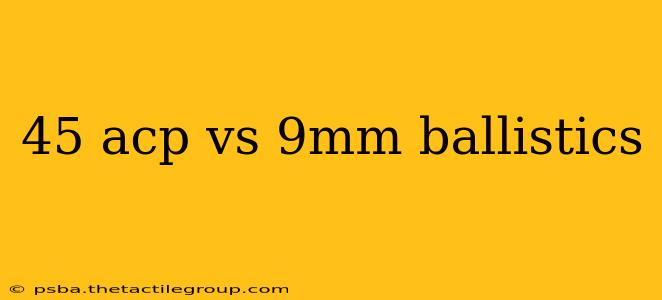Choosing between a .45 ACP and a 9mm handgun is a common dilemma for both seasoned shooters and newcomers. This comprehensive comparison dives deep into the ballistic differences between these two popular calibers, helping you make an informed decision based on your specific needs and preferences. We'll examine factors like bullet energy, stopping power, recoil, and accuracy to paint a clear picture of each cartridge's capabilities.
Understanding the Basics: .45 ACP vs 9mm
The .45 ACP (Automatic Colt Pistol) and the 9mm Parabellum (also known as 9x19mm) are both widely used handgun cartridges, but they differ significantly in design and resulting performance. The .45 ACP is a larger, more powerful round with a heavier bullet, while the 9mm is smaller, lighter, and generally offers higher capacity magazines.
Bullet Diameter and Weight: A Key Difference
The most immediately apparent difference lies in the bullet diameter:
- .45 ACP: Features a .452-inch (11.5mm) diameter bullet. Bullets typically range from 200 to 230 grains.
- 9mm: Uses a .355-inch (9mm) diameter bullet. Bullet weights commonly range from 115 to 147 grains.
This size difference directly impacts the bullet's energy transfer and penetration.
Ballistic Comparison: Energy, Penetration, and Recoil
Let's delve into the key ballistic characteristics of each caliber:
Muzzle Energy: A Measure of Power
Muzzle energy is the kinetic energy a bullet possesses as it leaves the barrel. Generally:
- .45 ACP: Delivers higher muzzle energy due to its heavier bullet and slower velocity. This translates to more potential stopping power, particularly at close range.
- 9mm: Offers lower muzzle energy than the .45 ACP, but modern 9mm ammunition often compensates with higher velocities, resulting in comparable effective range.
It's crucial to understand that muzzle energy isn't the sole indicator of effectiveness; factors like bullet construction and placement play a crucial role.
Penetration: Depth of Impact
Penetration refers to how deeply a bullet will travel into a target.
- .45 ACP: Typically exhibits greater penetration, especially with heavier bullets, though this can vary greatly depending on bullet design and target material.
- 9mm: Can achieve sufficient penetration for self-defense situations, particularly with jacketed hollow-point (JHP) rounds designed for expansion and controlled penetration.
The ideal penetration depth is a balance; sufficient to neutralize a threat but not so excessive as to overpenetrate and pose a risk to bystanders.
Recoil: Managing the Force
Recoil is the backward force felt by the shooter upon firing.
- .45 ACP: Generally produces noticeably higher recoil due to its heavier bullet and greater energy. This can impact accuracy, especially for less experienced shooters.
- 9mm: Offers significantly less recoil, allowing for faster follow-up shots and greater control, particularly in rapid-fire situations. This is a considerable advantage for many shooters.
Accuracy and Effective Range
Both calibers are capable of accurate shooting at typical self-defense ranges. However:
- .45 ACP: The heavier recoil can make achieving consistent accuracy at longer ranges more challenging for some shooters.
- 9mm: Lower recoil often translates to better accuracy and faster target acquisition, making it potentially advantageous in dynamic situations.
The effective range of either caliber primarily depends on the shooter's skill and the specific ammunition used.
Stopping Power: A Complex Issue
Stopping power is often debated and misunderstood. While the .45 ACP’s higher energy and larger diameter might suggest superior stopping power, modern 9mm ammunition, especially JHP rounds, has narrowed the gap considerably. The effectiveness of any round depends significantly on shot placement. A well-placed 9mm shot is far more effective than a poorly placed .45 ACP shot.
Conclusion: Choosing the Right Caliber
The "best" caliber depends entirely on individual needs and preferences. The .45 ACP provides greater muzzle energy and potentially higher stopping power, but with increased recoil. The 9mm offers less recoil, higher capacity magazines, and modern ammunition that closes the performance gap. Consider factors like your experience level, intended use (self-defense, target practice, etc.), and personal comfort when making your choice. Ultimately, the best way to decide is to try both calibers at a shooting range.

